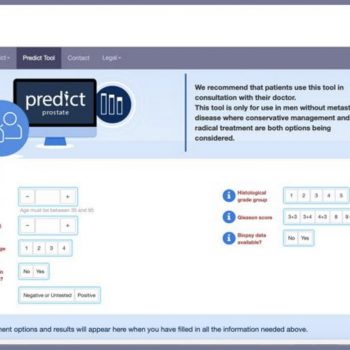Evidence-based web tool aims to help inform treatment options in early prostate cancer
 PREDICT Prostate has been developed by researchers at the University of Cambridge, led by Mr Vincent Gnanapragasam (pictured, right), University Lecturer and Honorary Consultant at Cambridge University Hospitals, and undertaken by Dr Thurtle, both of the Academic Urology Group in Cambridge, and in collaboration with Professor Paul Pharoah of the Department of Cancer Epidemiology.
PREDICT Prostate has been developed by researchers at the University of Cambridge, led by Mr Vincent Gnanapragasam (pictured, right), University Lecturer and Honorary Consultant at Cambridge University Hospitals, and undertaken by Dr Thurtle, both of the Academic Urology Group in Cambridge, and in collaboration with Professor Paul Pharoah of the Department of Cancer Epidemiology.
The tool brings together the latest evidence and mathematical models to give a personalised prognosis, which aims to empower patients as they discuss treatment options with their consultant.
Mr Gnanapragasam said: “We believe this tool could significantly reduce the number of unnecessary – and potentially harmful – treatments that patients receive and save the NHS millions every year.”
Risk classification
Progression of prostate cancer is variable: in most cases, the disease progresses slowly and is not fatal. But in a significant number of men, the tumour will metastasise (spread to other organs in the body), threatening their health.
When a patient is diagnosed with prostate cancer, they are currently classified as low, intermediate or high risk, according to guidelines provided by NICE (the National Institute for Health and Care Excellence).
Depending on the patient’s risk group, clinicians will recommend either an ‘active monitoring’ approach or treatment. Treatment options include radiotherapy or surgery and can have potentially significant side-effects, including erectile dysfunction and urinary incontinence.
But the risk classifications have been shown to be only 60-70% accurate – meaning many men may elect for treatment when it is not necessary.
What PREDICT Prostate does is take routinely available information including PSA test results, the cancer grade and stage, the proportion of biopsies with cancerous cells, and details about the patient including his age and other illnesses.
It then gives a 10-15 year survival estimate. Importantly, the tool also estimates how the patient’s chance of survival differs depending on whether he opts for monitoring or treatment, providing context of the likelihood of success of treatment and risk of side effects.
- In a randomised study of almost 200 prostate cancer specialists, those clinicians given access to the PREDICT tool were less likely to recommend treatment in good-prognosis cancers
- The tool is recommended for use only in consultation with a clinician. It is not suitable for men with very aggressive disease or who have evidence of disease spread at the time of diagnosis
- Every year, tens of thousands of men are diagnosed with prostate cancer. But what should they do? Listen to Vincent Gnanapragasam’s interview with the Naked Scientists



